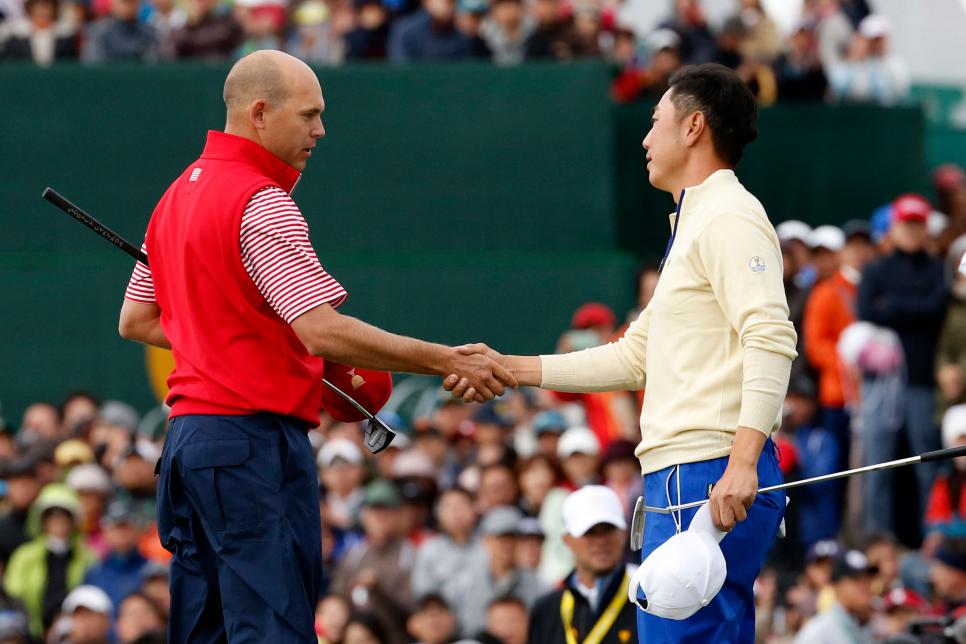INCHEON, South Korea -- Destiny doesn’t play favorites, and it doesn’t have a conscience. But it does have a way of circling back and compensating for some of its past oversights.
Bill Haas was 13 years old when he watched his father compete in the 1995 Ryder Cup at Oak Hill CC in Rochester, N.Y., and the elder Haas still feels the sting of disappointment in losing three of four matches that week. Included was a gut-wrenching setback to Philip Walton in the penultimate singles match. Haas chopped up the 18th hole and lost 1 up when a halve would have enabled the U.S., winners in 1993, to keep the Cup.
Fast forward to Sunday at Jack Nicklaus GC, where Jay Haas, the U.S. captain in the Presidents Cup, could do nothing but watch as his son battled local favorite Sang-Moon Bae in the 12th and final singles match with the Presidents Cup hanging in the balance. Playing for your teammates and your country are pressure enough, but when your father, who used one of his two wildcard picks on you, is the captain, and you’ve gone winless in two previous matches, breathing ceases to be involuntary.
"It was different from anything else I’ve ever felt on a golf course,” said Bill, trying to recall the sensation of competing with so much riding on the outcome. "There were so many things running through my head. I had trouble concentrating. I don’t know how I got through it.”
He got through it with good shots, the product of a lifetime in the game with his father and his uncle, Bob Goalby, a former Masters champion. And he got through it with a calmness he never knew he had, even though his hands felt like they were melting and his head was swimming. Somehow, he held off Bae, who was enduring his own little slice of pressure-induced sickness, for a 2-up victory that enabled the United State to eke out a 15 ½ to 14 ½ victory over a game International Team.
It was America’s ninth win in 11 stagings of this biennial competition. It was Bill Haas’ first win truly that wasn’t just for himself. “It’s a lot harder to hit a shot when you’re thinking about all the people it could affect,” Haas said.
Jay knows. He remembers. “I thought of that. It wasn't pretty down the stretch there [at Oak Hill] … if I could have parred the last hole, beaten Phil Walton,’" he said. “But yeah, I thought, that's 20 years ago. And Bill was there watching me play, and I remember -- I've told the story many times, that I wish I would have just gotten up on the 18th hole and swung as hard as I could like I was in a driving contest and maybe hit a better shot. He's heard me say that.”
Strangely, for much of the day it appeared that Haas’ match with Bae would be of little consequence. The U.S., which had a one-point lead entering singles, led in nine of the 11 matches before Haas and Bae embarked on their round. But as the day progressed, and the twists and turns of match play rewarded and rescinded points, the final match proved the decider.
Haas, who never trailed, struck a variety of quality shots down the stretch. He never gave Bae an opening to wriggle his way into flipping the match, let alone wriggling in for a halve. His dad noticed. And when it was over, both men were holding back their emotions.
Dad eventually relented.
“I don’t know if I’m going to get through this,” Jay Haas, 61, said, holding back tears as he began talking with NBC’s Roger Maltbie. He sniffed, tried to compose himself, and then said, his voice cracking, “I can’t do it.”
When he finally pulled himself together, Haas said poignantly, “When we put him out 12th, I had no idea, obviously, that was going to happen,” the captain said. “But he played beautiful. … I couldn't have even dreamt this.”
Neither could Bill. “To be put in that position, and the way it worked out was a very great moment for me and my dad, and certainly for the whole team,” he said.
Weird. Nearly 20 years to the day, the son got the point for his father that his father couldn’t get when given the chance. It didn’t make the moment bigger, just more significant, more meaningful, though Jay wasn’t buying it.
“So for him to do that down the stretch, is not vindication or anything like that, but just how things work out, and 20 years went by in a blink. Glad it worked out,” he said, his eyes glistening.
He didn’t say it was meant to be. He didn't have to.
